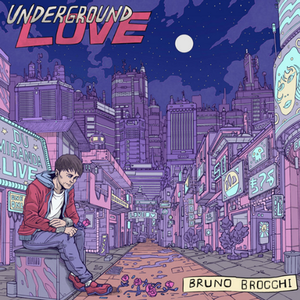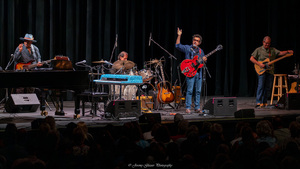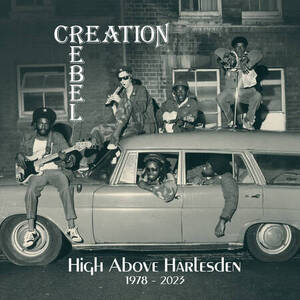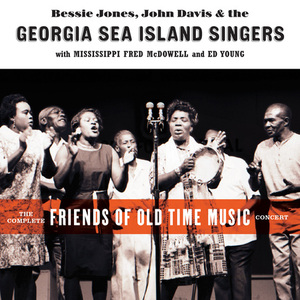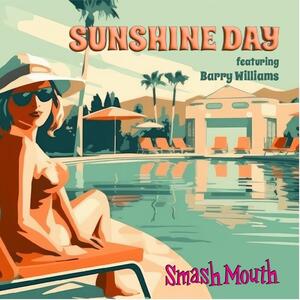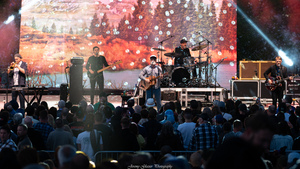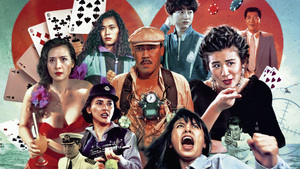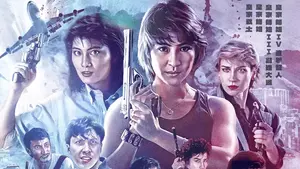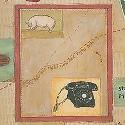
Ron MacLean
Some Facts. Some Fiction. Some Internet.
S.D. Green
“Okay, rule 1: You have to make me sound funny, even when I’m not. Rule 2: I don’t multitask. So we stay on one thread of conversation at a time. If you jump in on me, I disappear. You never hear from me again.”
That’s how this interview starts if it’s taking place in the imagination of author Ron MacLean. He might have been serious about that disappearing thing. His new collection of short stories, Why the Long Face?, is a smattering of characters lost and longing for intimacy, strewn across the American landscape: a scientist searching for the youth gene, on a road trip in a convertible with his fat benefactor; a trucker driving a load of pecans into yawning black holes; and an amateur detective playing zen Sherlock Holmes to a Thelonious Monk soundtrack. MacLean’s writing is taut and lithe, traversing wide philosophical space with a smile, unforced and quirky, ready to surprise and sensitize to the human condition. MacLean’s facility with human experience has earned him the Fred Exley Award for Short Fiction and publication in Other Voices and GQ magazine.

Since his work is so preoccupied with intimacy and connection between people, even when separated by physical distance, we agreed to conduct this interview in cyber space: chatting online. The idea was to “see” his writing, like we would “hear” a musician in an audio interview. It also seemed appropriate, for an author whose work includes many scientific theories and historical characters, that we be able to hyperlink to references (they are embedded in the body of the interview, for educational purposes only!).
Mr. MacLean was gracious enough to agree to this experiment. What follows is a lightly edited transcript of our conversation, riddled with the syntactical quirks of “new grammar,” the lazy/creative talk common in our everyday texts and emails (mostly on my part). We wanted to test how medium can alter communication. I asked Ron MacLean how he felt the Internet was changing literature and his writing in particular. It starts out simple enough, before becoming something all together different….
8:03 PM ink19: let’s start with the softball question. How did you become a writer?
rmaclean: I wanted to write since I was 6; started as a journalist, then acknowledged I much preferred, and was better at, making things up.
ink19: haha
cool
what kind of journalism?
rmaclean: Newspapers. My first job out of college was with the Boston Phoenix – alternative weekly. Got to do some investigative work.
ink19: ah… so, what was your first published fiction?
rmaclean: A short story called “Albemarle Hill,” published in Other Voices, a magazine I still admire. And has published me again since, in what I consider my more mature voice.
ink19: Blue Winnetka Skies came before Why the Long Face? Most writers release the short story collection before the novel. Was BWS the first thing you published under your name as a stand alone piece?
rmaclean: Yes. I’ve always been bad at following the rules. My agent at the time wanted a novel. I’d just had a big splash with a story in GQ and a big award, and he wanted to go straight to a novel. And also, I had an idea for one. That one tanked, but it got me going on Blue Winnetka Skies.
ink19: how does the whole thing with agents work? did you have to search for a guy who shares your vision? what is that relationship like?
rmaclean: Definitely important to search for someone who understands your vision. Though I guess the first criteria is someone willing to represent you in the marketplace, which means they have to believe you can, someday, make them some money. The ideal, I think, is someone who shares your vision and can be a voice to help guide the work.
ink19: interestingly, that’s kind of the relationship between horst and otto, two visual artists, in your short story “Figure with Meat.” Do you have that kind of relationship with other writers? People who guide you or influence you? Even adversaries?
rmaclean: I hadn’t thought about that connection. (more coming)… I hate thinking of myself as Otto. I’d much rather be Horst, but yes, I do have that with other writers. A couple in particular. The writer friends I value most are the ones who push me, who don’t let me rest in “good enough,” or in what’s easy for me. The influence comes in always trying to make ourselves, and the work, better. And yeah, in a funny way that’s true of adversaries. A couple of writers it works that way with. And that agent I was telling you about kind of became an adversary. At least, our visions diverged, and I honed mine to some extent by playing against his.
[here, there’s a brief exchange about how awkward this medium is]
ink19: it is kind of weird, isn’t it?
rmaclean: Just impossible to read context. And I realize I depend a lot on context.
ink19: it is very much a blind game. but people talk like this all the time. a lot of your characters’ dialogue takes place on the telephone. is that a conscious decision to have conversations taking place in that realm?
rmaclean: Hah. Yes, it is. So much of what I write about is the connection – or lack of it – between people. The telephone is perfect for that, because it has the illusion of intimacy, but it’s so tenuous. You’re not really with the person, and there’s so much you can miss out on (even tone, nuance, gesture, impatience, etc.), but it can be a medium of real connection, especially for those of us (most of us) with close friends who aren’t geographically close.
ink19: yes. distance and detachment are prominent concepts in your stories. so the phone is like a – i don’t know if muse is the right word – but a cipher, maybe, for that?
rmaclean: yeah, a cipher for that detachment. “South of Why” is maybe the perfect example of that to me.
ink19: yes. and you have some lovely dialogue that kind of only works on the phone. it has some great moments.
rmaclean: thanks. i think of that one because the situation in the room is one thing, and there’s a totally different situation on the phone, and in fact the narrator considers it his job – his mission – to create a convincing reality on the phone, in order to rescue his friend’s marriage. so it’s a very intimate situation, but there’s all kinds of distance, in both good (helpful) and bad ways.
ink19: exactly. and i had a quote in my notes that i love from that story but i can’t find it….i think i can find it…hold on… this pertains to the whole “balancing what is happening in the room” with trying to save his friend’s marriage stuff.
you there?
rmaclean: I am. I thought you were looking for the quote.
ink19: yeah. i posted it but we lost connection for a minute. here it is…
“Anna and Frank exchanged a beautiful glance, the look two aliens might exchange on simultaneously encountering an unfamiliar planet.” This is a fantastic simile. Tell us a bit about how a simile forms in your mind? In Blue Winnetka Skies, your first novel, there are narratives playing out on multiple movie screens. It’s gotta be a bit like that in a writer’s head, a lot of traffic, because you’ve got your own experience and, maybe, a metaphor for that, which you’re telling as a narrative, and then the similes that pop into your head. How do you manage that traffic?
rmaclean: wow. good question. answer coming in pieces…
That particular simile, and maybe if I’m honest most of them, came from trying desperately to convey what I could see/feel in that moment. What I knew the characters were experiencing that I wanted the reader to experience. Trying to get that right – to get what’s in my head into words so that people see what I see, and therefore can feel some of what I feel – is the biggest challenge. In that case, I could see the look that passed between Frank and Anna, and I tried about fifty ways to describe it before landing, finally, on that metaphor. one thing I’ve learned in years of doing this is how subtle shifts, even just a word or two, can affect how people experience a scene. it’s hard, but it’s also the joy of the work.
ink19: i find this fascinating because, talking about context, this [chatting online] is exactly the relationship i have with you when i’m reading your work. there isn’t the context of hearing your voice or seeing your face. it’s delivering context, exclusively, with words. and this is how people talk these days. does that make us more literary as a society, or less?
rmaclean: huh. good point. never thought about it that way. you tell me. i know that when i’m uncomfortable about it, it’s because i’m trying to respond quickly to someone (to stay engaged), but also carefully. that whole truth and honesty thing. hard for me to do quickly and carefully. but I do think people develop the skill. I felt the same way about email when it started, and I now most often prefer that to the phone. so I think it’s all in how we use it.
8:51 PM rmaclean: i think we’re developing different types of literacy. the ability, for example, to construct a context from fragments, to “follow” a “story” that way. and I love that. at the same time, sometimes I worry that, as a culture, we’re losing the ability to focus on one thing. I mean, when people chat, is that ever the only thing they’re doing?
ink19: no….you’re right. i had a note that i can’t find…
but you should read this article: 8:53 PM http://www.theatlantic.com/doc/200807/google
basically, my question is, how does the Internet change the way we think and read? how we process information? how does it affect your work?
rmaclean: it’s a great question. and I do spend time thinking about it, when I’m not Googling, or following some wild hair of an idea and doing web research (for instance, on Finland’s King Erik the Unfortunate).
ink19: haha
rabbit holes…
rmaclean: Yeah. Seriously. One thing is that the web makes research easier, which means that for me, it makes it possible…
And another is that it does put pressure on using words well in writing. Making it shorter. Even in a novel.
I also think the web has opened more people up to nonlinear thinking.
ink19: yes. and abandoning traditional punctuation. (you may notice i gave up a long time ago in this conversation….all for the sake of expediency)
rmaclean: Let me take that further. I know the web has opened more people up to nonlinear thinking. To the types of connections that aren’t immediately apparent. And while that’s my natural habitat, it also pushes me to be better.
ink19: how so?
rmaclean: My stories have to compete in a world where many (most) people’s encounters with the written word are on a computer screen, in email or chat, or whatever else. If I want people to listen, i have to communicate in a way i can be heard.
ink19: interesting you say that, because you have a very economical style.
rmaclean: THAT part doesn’t come naturally. first drafts come fairly easily to me. most of my work is in honing, which is usually pruning. paring down. the first drafts are almost always a mess. my writer friends who read my work dread those drafts. they’re practically incoherent.
ink19: well, here’s a note i had:
Expressing human condition in concise phrases.
“His wore that grin that is my gift to him. I can amuse, but I don’t invest. When things stop being easy, I stop doing them. By the time I recognized this as a character flaw, it was too deep in me to change.”
rmaclean: I absolutely have to work at it.
ink19: this is from, um… “Last Seen, Hank’s Grille.” i think it’s a skill of yours. so it’s interesting to me that it doesn’t come naturally.
rmaclean: It’s very gratifying to me when those resonate with people. Because those lines are SO much of the work. I appreciate that a lot…
I think I’m good at seeing the human condition. But to find the right words to express a moment, or capture a moment, so that it feels genuinely human, and so that it happens in the right place in the story, that doesn’t come easily at all. But how could it?
ink19: yeah. there’s a lot of rubble to sift through.
rmaclean: Hah. Yeah. I think we all grope for anything that resembles truth.
ink19: i also like this…complete with some questions:
“Beth called. Logan still closed. She’s considering flights to Hartford, even New York, where it’s turned to rain. ‘Listen,’ I tell her. I’ve been thinking about the struggle to retain meaning in life. ‘Commercials are intimate, and better scripted. What does that leave us?’“ excerpt from “terror/home”
You have a way of dealing with philosophical issues in a natural way. What does he mean by that? Do you think commercials tell better stories than real life? Movies and books?
(it’s very concise, but is about so many big ideas)
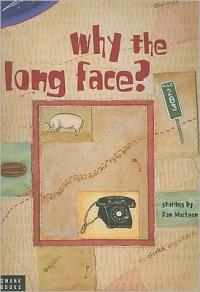
rmaclean: Thanks…I’m thinking….No, I don’t think commercials tell better stories than real life, or than movies and books. But I do think they tell good stories, and so it gets harder to tell which stories to trust – who’s really seeking to communicate and explore the human condition, and who’s just trying to sell me something?
Am also finding a snippet from a talk I gave…9:10 PM This from “Risk Everything: Making Literature Matter in the 21st Century”:
…books have long since been supplanted by movies, television, music, even the Internet as our culture’s primary storytelling vehicles. As a delivery method for narrative, books are archaic. Ineffective for delivering popular entertainment…
ink19: books are not good at delivering “the sound bite.” but are we still getting the nuance? the power of the words?
rmaclean: well, i think that is where books still have value. For me, that’s the difference between entertainment and art.
ink19: “[Becca] is of the opinion that Tom has a head injury, that this explains his decreasing interest in things like paying his bills on time, or his willingness to drive cross-country with Fillmore Priest….A concussion, a few hours of jumbled memories, maybe an increased sense of forgetfulness. And while he hasn’t had any physical problems since, Becca believes something happened there.”
Many of your stories are about loss and displacement. Several of your characters are lost or simply disappear, both physically and emotionally. Many of your characters have biological/physiological explanations for these issues: the above quote from “Last Seen, Hank’s Grille;” “Strange Trajectory: A Story of Phineas Gage,” Phineas’ frontal lobe damage impacts his social skills (http://neurophilosophy.wordpress.com/2006/12/04/the-incredible-case-of-phineas-gage/); “Mile 283” Ellen suffers from a kind of narcolepsy that displaces her; “Figure with Meat,” Otto is developing a tunnel vision blindness. Do you believe the brain voluntarily short circuits after trauma? Does science explain why our emotions fail us?
rmaclean: I’m fascinated by loss and displacement, and by the way we all keep going despite those things. The way(s) we manage to connect…
I don’t believe science fully explains why our emotions fail us, nor do I believe that emotions account for everything. What fascinates me is the way those things play out in us, in different ways in each of us…
I do, for instance, believe the brain protects itself after trauma. That’s what interests me about Ellen, in “Mile 283”; and about Phineas. In fact, part of what drove me to write Phineas’ story was that among the doctor’s notes was something to the effect that Phineas was angry and out of sorts. And I remember thinking, the guy had an iron rod explode through his skull – i would hope he’d be angry and out of sorts…
Science, to me, explains a lot of what happened with Phineas, but I think the mystery of the human personality runs pretty deep. And I love that about us.
It’s what can’t be explained about us, or what resists understanding, that interests me most.
ink19: do you have a science background? you use a lot of it in your writing?
rmaclean: I was kicked out of eighth grade science for goofing off. I bombed science throughout high school. And I’ve spent most of my adult life trying to make up for that stupidity. I try to self-educate.
ink19: You work a lot with historical figures (Phineas Gage, Gertrude Stein, Gottfried Leibniz), real people who have real histories and their own mythologies. I’d imagine in some ways this is like working with a character from another novel. How do you approach this? Are they easier or harder to write than your purely fictional characters?
rmaclean: It’s funny, because I don’t think of myself as working a lot with historical figures, but I obviously do (Gene Autry is a character in my novel)…
rmaclean: So I don’t have a single approach to writing about them. It kind of happens in each case, and then I do what the story requires of me. Gertrude Stein, for instance, is a writing hero of mine, and she just thrust herself into the “Las Vegas Wedding” story. Nothing I could do about that one except try to do her justice…
rmaclean: Phineas Gage, on the other hand, I knew I wanted to write a story about. So I learned everything I could about him – even managed to get a photocopy of his doctor’s original notes from his journal.
ink19:“Las Vegas Wedding” seems like a dream to me. Did it come from that?
rmaclean:“Las Vegas Wedding” did not come from a dream. I was trying to write a nonfiction piece about a Las Vegas wedding I actually attended. What came out was the only way I could communicate what it actually felt like to be there. I still tell people that’s the one true story in the book.
ink19: interesting. it’s so surreal…
rmaclean: LV is pretty darn surreal, at least to me. That story was totally flat until Gertrude and Buffy entered it. Then, all of a sudden, it felt to me the way it had really felt to be there and take part in the wedding.
ink19: so, they came in, uninvited? like wedding crashers?
rmaclean: haha. I like that. Yeah. Gertrude was Vince Vaughn. Or vice versa. But it’s true. They did come uninvited.
ink19: so, does that happen a lot? characters pop up without your control?
rmaclean: Yeah. Characters. Or turns of plot. For me, it’s really all about the germ of an idea that I’m trying to get to. I don’t understand it when I start. It’s an image, or a moment, that grabs me for reasons I don’t understand. And then my job is to keep finding moments, scenes, characters that feel part of that.
ink19: Excerpt from “Last Seen, Hank’s Grille” “[Tom and Becca’s] family was religious, mine wasn’t, but I went to church with them – Southern Baptist – and half lived at their house through my adolescence… He wanted to believe, and if you could create faith through sheer effort, Tom would have done it. But I guess he couldn’t reconcile the church he knew with the world he saw, with his own emerging inclinations… So it interests me that Tom chose science in the end, as if he, like Becca, had been searching for a system that could supply answers.”
“South of Why” is about faith. Many of your characters are believers: “Last Seen, Hank’s Grille,” “Over the Falls.” What are your thoughts on the omniscient narrator? It is God-like in the book’s universe. Having this kind of power, does that impact how you understand God? Are you a believer?
rmaclean: yes. in a manner of speaking, I am.
ink19: so, how does writing as an omniscient narrator affect your view of a “god.” is God a writer? are we all characters in his book?
rmaclean: ah…give me a minute on that one…That’s tricky territory for me. Makes me want to quote Flannery O’Connor, who famously said: “if you want to know what a story is about, read the story.” That if she could have said what she wanted to say any other way, she would have. That’s sort of how I feel about any “theology” in my fiction. I think a view of the world, of God, is in there, but I am extremely reticent to put it in a sentence or two…
One of the things I’m proudest of about this collection is that my editor (an atheist), loves it for its humanity, and sees in it a spirituality she can (mostly) relate to. And a friend of mine who’s a minister told me after she read the book that she wished she were teaching in a seminary because she’d make the book required reading for its theology of grace. Those things in combination make me very happy.
On the craft side, the omniscient narrator is one of those things you’re not supposed to do anymore. It’s so 19th century. It’s not supposed to work. So I find myself drawn to it, the way I’m drawn to starting a story with a dream, or having a character who can’t let go of his dead wife. I’m drawn to the extremes there, and I like using tools that aren’t supposed to work when a situation calls for them. I guess I’ve learned to trust myself that I’m so drawn to nuance that I can get away with broad strokes occasionally. I don’t think we’re all characters in God’s book. I do envision God as a writer, and part of the joy I find in the work is in realizing the joy of creation. But i think a key to my theology, such as it is, is that none of us, even the best and brightest, understands more than a crumb of what there is to know.
ink19: so, in closing…now that you’ve done the interview…if this interview was a short story, how would it start?
rmaclean: ha! it would start: “Okay, rule 1….”

